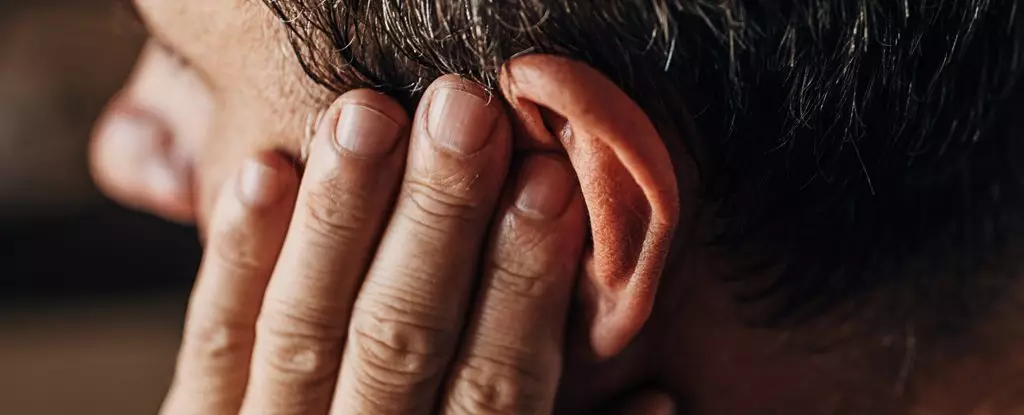Tinnitus is a pervasive condition that affects an estimated 15% of the global population, characterized by the perception of sound—often described as ringing, buzzing, or hissing—in the absence of any external auditory stimuli. While commonly associated with hearing loss, tinnitus can exist independently, creating profound challenges for millions. Those who experience tinnitus frequently face not only the annoyance of phantom sounds but also the potential for serious mental health ramifications, including stress, anxiety, and depression. Unfortunately, as it currently stands, there is no definitive cure for tinnitus. Thus, exploring effective management strategies becomes crucial.
Tinnitus presents itself as a phantom percept, a phenomenon where the brain generates sensations that do not correlate with external stimuli. This phenomenon is typically experienced during sleep; thus, individuals with tinnitus may confront these auditory distortions while wide awake. Recent research has illuminated the unique alterations in brain activity associated with tinnitus, particularly in auditory processing regions. Understanding these neural mechanisms might offer insights into managing the distressing symptomatology of tinnitus, particularly concerning its relationship with sleep.
The brain is an intricate organ, and its activity fluctuates with our waking and sleeping states. Notably, regions typically engaged in auditory processing may exhibit abnormal levels of activity in individuals diagnosed with tinnitus. This discordance suggests a compelling interplay between sleep and the experience of tinnitus, warranting a deeper exploration into how restful slumber—or lack thereof—can dramatically shape individual experiences with the condition.
The Role of Sleep: A Crucial Element for Brain Recovery
Sleep consists of various stages, with slow-wave sleep (SWS) often regarded as one of the most restorative phases. During SWS, the brain exhibits distinctive wave patterns, facilitating recovery and cognitive function enhancement. It is during this period that the brain’s neurons engage in important restorative processes, which play a fundamental role in information storage and auditory processing.
However, individuals suffering from tinnitus frequently experience disruptions during sleep, leading to inadequate amounts of SWS. Studies indicate that hyperactive areas of the auditory cortex may persist in a heightened state of activity even during sleep, potentially resulting in chronic disturbances. The compromised quality of sleep can perpetuate a cycle of heightened tinnitus perception, leading to increased psychological distress and further sleep disturbances.
Recent research has identified compelling links between sleep quality and tinnitus experience. Notably, despite generally exhibiting less SWS than healthy counterparts, some patients have been found to maintain an ability to achieve deep sleep. This unique phenomenon may elucidate the brain’s capacity to suppress tinnitus during sleep—a potential avenue for therapeutic intervention. Understanding the dynamics of sleep stages, particularly the restorative powers of SWS, could lead to innovative management techniques for those suffering from tinnitus.
Additionally, variations in neuronal connectivity, particularly during sleep, contribute to the persistence of tinnitus symptoms long after initial triggers, such as exposure to loud noise. Insights gained from examining how tinnitus fluctuates throughout the night could grant clinicians essential tools to address variations in symptom intensity, ultimately aiding in personalized treatment strategies.
Exploring methods to enhance sleep quality in tinnitus patients may yield promising avenues for relief. One potential strategy includes employing sleep restriction paradigms, encouraging individuals to engage in sleep only when genuinely fatigued. This approach may heighten the drive for restorative sleep, potentially enhancing the amount of SWS experienced by individuals with tinnitus.
Future investigations could benefit from longitudinal studies that capture sleep stages and tinnitus fluctuations concurrently, thereby revealing more nuanced relationships and mechanisms at play. Understanding the unique stages of sleep, including rapid eye movement (REM) sleep, and their distinctive brain activity patterns might unlock further insights into developing effective interventions.
The complex interplay between tinnitus and sleep poses both challenges and opportunities for patients and researchers alike. Gaining a more profound understanding of the mechanisms at play may ultimately lead to innovative management strategies that mitigate the burden of tinnitus and enhance overall well-being. Recognizing sleep as a crucial factor in the tinnitus experience opens pathways for new treatment paradigms aimed at improving the quality of life for the millions affected by this enigmatic condition. As ongoing research continues to unravel the links between sleep and tinnitus, the prospect of more effective therapies becomes increasingly attainable.


Leave a Reply